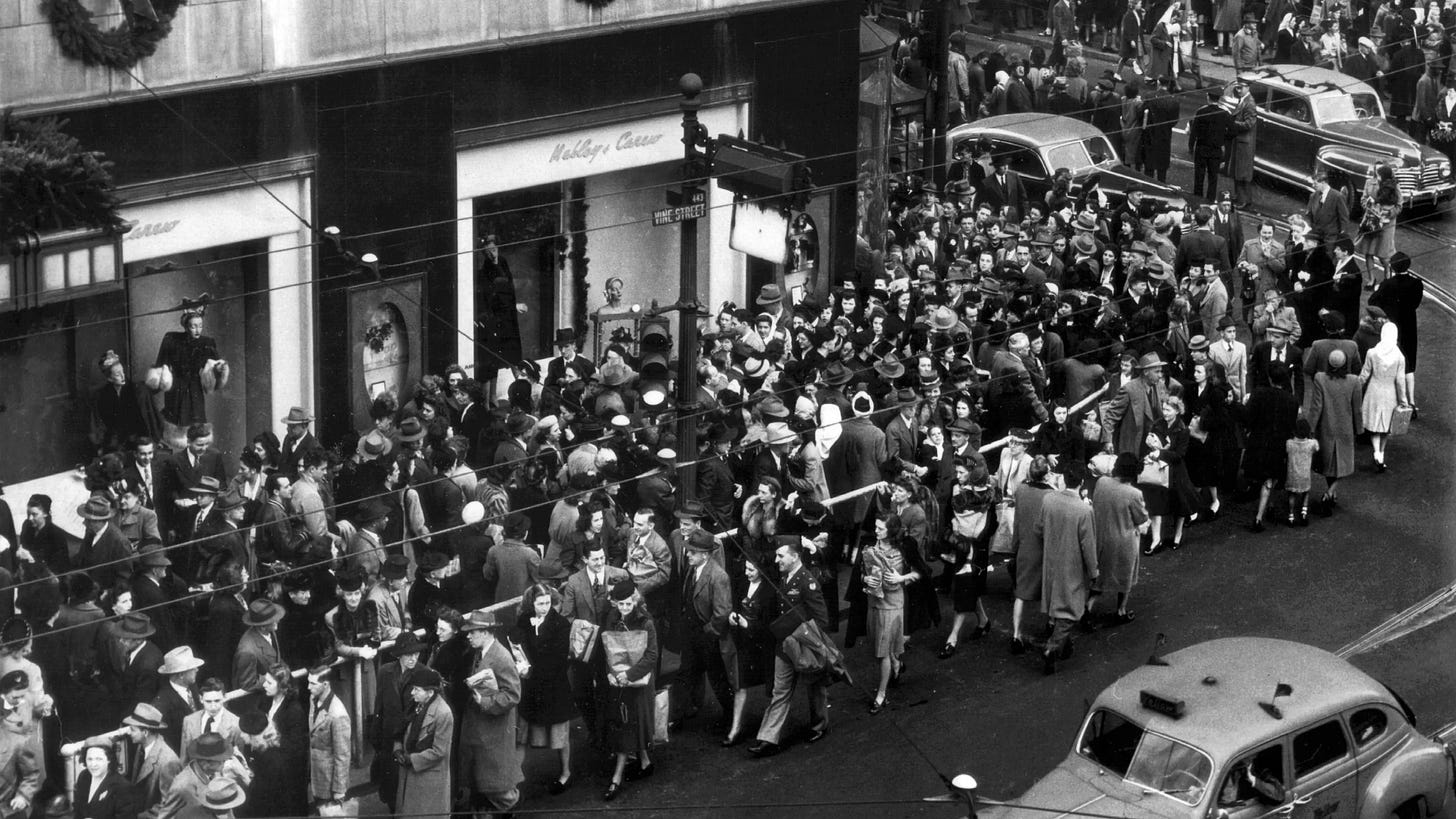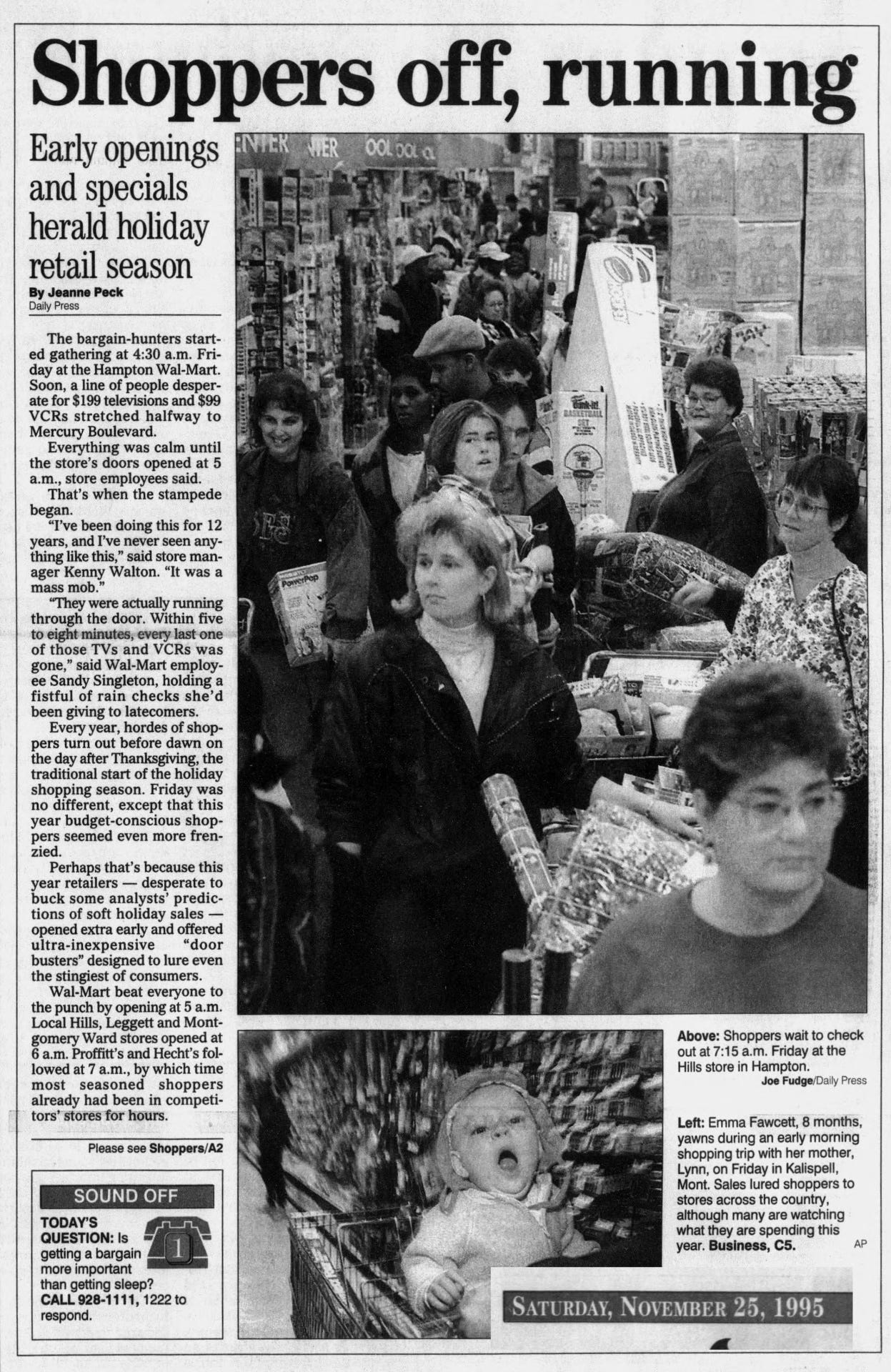Black Friday / Cyber Monday is easily my most hated time of year.
I’ve ranted about it before, in an older newsletter.
I don’t like sales that much…
PTSD from owning a “store”…
Unless of course I need a vacuum, or candles from SSENSE, then it’s fine.
I keep way overthinking this Newsletter, I’ve been saying every week that I need to start taking this thing a bit more seriously, and not write exclusively about the things I think about between eating a gummy and falling asleep…
This week is not that week.
I was aggressively inundated with sales on my social media last week (month, year, forever), as I assume you all were as well.
And I thought about the fact that I don’t know why it’s called Black Friday, or why it even exists in the first place.
I started to read about it.
I learned more than I needed to, and now I’m going to impose that on you.
Black Friday, the unofficial start of the holiday shopping season, is synonymous with massive discounts, long lines, and frenzied crowds.
But the history of this shopping extravaganza is far more complex, rooted in chaos, controversy, and “clever” marketing.
The term "Black Friday" wasn’t always about shopping.
In fact, it first appeared in 1869, describing a catastrophic financial event.
Speculators Jay Gould and James Fisk attempted to corner the U.S. gold market.
Gould and Fisk set their sights on the gold market, which was crucial to the U.S. economy at the time.
Their goal was to corner the market, a tactic where they would buy up massive amounts of gold, creating artificial scarcity. This manipulation would drive gold prices sky-high, allowing them to sell at an enormous profit.
To achieve this, they leveraged political connections, including relationships with members of President Ulysses S. Grant’s administration.
Their plan seemed to work at first.
As gold prices soared, panic spread among investors, who scrambled to buy gold in fear of being left behind.
The effects rippled through the economy: commodities tied to gold, such as wheat and corn, became exorbitantly expensive, hurting farmers and consumers alike.
However, the bubble burst on Black Friday, September 24, 1869, when President Grant, aware of the manipulation, ordered the release of government gold into the market.
This move flooded the market with supply, causing gold prices to plummet within hours.
Investors who had bought gold at inflated prices suffered devastating losses, while Gould and Fisk, having offloaded much of their gold in advance, walked away largely unscathed.
The collapse sent shockwaves through the economy.
The stock market plunged, farmers faced bankruptcy as crop prices nosedived, and businesses reliant on stable gold prices faltered.
The financial chaos earned the day its grim moniker: “Black Friday.”
Newspapers of the time emphasized the devastating impact, painting a picture of greed and corruption at the heart of the crisis.
The term re-emerged in the 1950s in a completely different context.
Police officers in Philadelphia began using "Black Friday" to describe the chaos that ensued on the day after Thanksgiving.
The city would be overrun with suburban shoppers and tourists who flooded in ahead of the annual Army-Navy football game on Saturday.
The result was clogged streets, overwhelmed stores, and a spike in theft and other disturbances.
Retailers disliked the negative connotations and attempted to rebrand the day as "Big Friday," but the name didn’t stick.
The phrase "Black Friday" continued to be used by police and eventually became widely associated with the bustling shopping day.
By the 1980s, the retail industry embraced the term, giving it a positive spin. Accountants use red ink to denote losses and black ink for profits, so businesses began promoting Black Friday as the day they “went into the black.”
The narrative shifted from chaos to celebration, framing the day as critical for retailers’ profitability.
This rebranding, paired with aggressive marketing campaigns, helped solidify Black Friday as the biggest shopping day of the year.
In the 1990s and 2000s, Black Friday became a cultural phenomenon.
Retailers competed to offer the best deals, leading to the rise of "doorbuster" sales and extreme promotions.
Stores opened earlier each year, with some even beginning sales on Thanksgiving evening, sparking debates about work-life balance for retail employees.
The day’s popularity also brought controversy.
Viral videos of stampedes, fights, and other dangerous incidents highlighted the downsides of the shopping frenzy.
Some stores began implementing crowd-control measures, while others moved their focus online to avoid in-person chaos.
The advent of online shopping transformed Black Friday. In 2005, "Cyber Monday" was introduced as the digital counterpart to Black Friday, encouraging consumers to shop from the comfort of their homes.
The rise of e-commerce giants like Amazon further shifted the focus away from physical stores, making online deals a core part of the Black Friday experience.
Today, many retailers offer deals weeks before Thanksgiving, blurring the lines of what was once a single-day event.
“Black Friday” has become shorthand for the entire holiday shopping season, with sales stretching into December.
Though rooted in American traditions, Black Friday has become a worldwide phenomenon.
Countries like Canada, the UK, Brazil, and India have adopted their own versions of the day, often aligning it with U.S. sales to capitalize on global retail trends.
Despite its popularity, Black Friday faces criticism.
Environmental advocates point to the waste generated by overproduction and fast consumption.
Others criticize the event for perpetuating consumerism and pressuring workers in retail and logistics industries.
Still, for many, Black Friday is a beloved tradition.
I guess it’s a time to score deals, prepare for the holidays, and participate in a shared cultural event.
It’s hard to hate on people taking advantage of big-box stores though, I’m actually always all for that.
Whether you see it as a celebration of savings, or a symbol of excess, Black Friday has firmly established itself as a hallmark of modern commerce.
My guess is, much like 97% of things, it only gets worse from here.
Thanks for reading.
Wesley
External Links:





